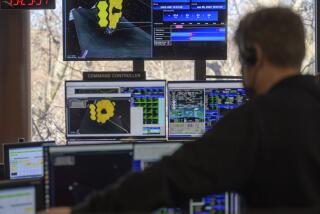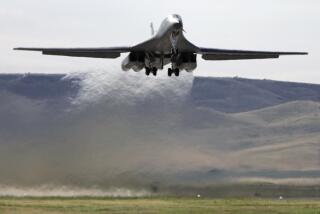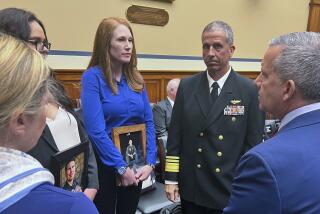Northrop Faulted on All Its Military Programs : Aerospace: An Air Force official tells a House panel that the firm is inexperienced as a prime contractor. The company says it’s improving.
- Share via
WASHINGTON — An Air Force review of Northrop Corp. this summer found serious problems across the aerospace firm’s corporate structure and in all of its military programs, including its $62.8-billion B-2 Stealth bomber project, an Air Force deputy chief of staff told a congressional panel Tuesday.
The special review, which was ordered by Assistant Secretary of the Air Force John J. Welch Jr., found that Northrop has had little experience as a prime contractor and that it operates as a “loose federation of autonomous divisions.” The Los Angeles firm has little or no executive development, and its leadership is loyal to the company “to a fault,” the review found.
The review’s briefing materials were released Tuesday at the hearing, which was called by an investigating panel of the House Energy and Commerce Committee. The subcommittee has been investigating Northrop for four years and is one of three congressional panels since 1987 to hold hearings about Northrop’s problems.
Under questioning by the panel, Brig. Gen. Robert W. Drewes, deputy chief of staff for contracting, could not identify a single Northrop program that is operating without significant difficulty. “In all the programs that we looked at, there were some problems,” Drewes said.
Rep. Ron Wyden (D-Ore.) asked in response, “Isn’t that a disgrace, General?”
“It certainly is not something to be proud of,” Drewes replied.
When Welch ordered the special review, he wrote to Northrop Chairman Kent Kresa, “The nature of the performance problems is most serious.”
Northrop spokesman Tony Cantafio said in an interview Tuesday that the “company recognized that it needed to make improvements in various areas and began doing that. That is still ongoing.” The Air Force has noted, he added, that Northrop has “initiated” corrective action in recent months in many areas of concern.
Kresa and other top managers, Cantafio said, are “committed to the strong follow-through that will make the changes endure and will carry out changes in other areas in the future.”
Separately, Welch said in an interview Tuesday: “I am not satisfied yet with the performance of Northrop.” Welch said the Pentagon was asking for “pretty remarkable performance” by the company and that Northrop’s problems are not unique.
He said Northrop started “a little further back” than the rest of the aerospace industry and has had to cover more ground to develop as a major weapons producer.
Drewes, the only witness called Tuesday, said problems were found in the B-2 bomber, Tacit Rainbow missile, the ALQ-135 radar-jamming system and unidentified black (secret) programs. He said the reviewers also found evidence of problems in the past with the MX missile but that the company seems to be doing a good job on it now. Nonetheless, Northrop lost the next contract in that program to Rockwell International earlier this year.
Drewes said the Air Force remains concerned about trouble with the Stealth bomber’s systems engineering, which integrates the bomber’s various systems, enabling it to operate as an effective weapon.
Northrop’s problems stem in part from the fact that it operates “on the frontiers of technology,” which often leads to difficulties when moving from research into production, Drewes said. But he added that the company’s corporate culture lacks the discipline required by the Air Force, in part because the firm has depended heavily on foreign military sales in the past.
When Northrop grew dramatically in the 1980s, going from 30,000 employees to 50,000 and rising from $1.6 billion in sales to $6 billion, Drewes said, the internal controls and management programs were unable to keep pace.
“In this rapid buildup, there was not the rigor we would like to have seen,” he said, adding later that “during the turbulence of that rapid growth, in some areas any discipline that they might have had was diluted.”
Drewes offered only the narrowest answers to the inquiries and declined to be specific in describing Northrop’s problems. He repeatedly refused to categorize his reaction to his findings, despite questions about whether he was “shocked” or “surprised” by the results.
Drewes said he was “impressed by the scope of the problems,” but he added that he was “impressed by steps Northrop is taking to correct them.”
He said the review specifically did not go into areas that are under criminal investigation for fear of compromising those other inquiries.
Northrop is the subject of 12 criminal investigations by Pentagon agencies, according to sources on the House committee. Separately, it is under investigation by a dozen grand juries in seven locations around the country, according to an opening statement released by Rep. John D. Dingell (D-Mich.), committee chairman.
Frantz reported from Washington and Vartabedian from Los Angeles.
More to Read
Inside the business of entertainment
The Wide Shot brings you news, analysis and insights on everything from streaming wars to production — and what it all means for the future.
You may occasionally receive promotional content from the Los Angeles Times.











